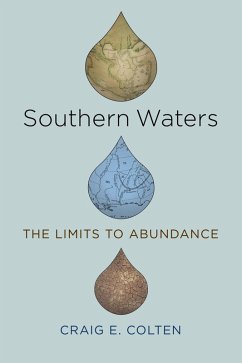Water has dominated images of the South throughout history, from Hernando de Soto's 1541 crossing of the Mississippi to tragic scenes of flooding throughout the Gulf South after Hurricane Katrina. But these images tell only half the story: as urban, industrial, and population growth create unprecedented demands on water in the South, the problems of pollution and water shortages grow ever more urgent. In Southern Waters: The Limits to Abundance, Craig E. Colten addresses how the South -- in an environment fraught with uncertainty -- can navigate the twin risks of too much water and not enough.
From the arrival of the first European settlers, the South's inhabitants have pursued a course of maximum exploitation and control of the area's plentiful waters, investing widely in wetland drainage and massive flood-control projects. Disputes over southern waterways go back nearly as far: obstruction of fish migration by mill dams prompted new policies to protect aquatic life as early as the colonial era. Colten argues that such conflicts, which have heightened dramatically since the explosive urbanization of the mid-twentieth century, will only become more frequent and intense, making the shift toward sustainable use a national imperative.
In tracing the evolving uses and abuses of southern waters, Colten offers crucial insights into the complex historical geography of water throughout the region. A masterful analysis of the ways in which past generations harnessed and consumed water, Southern Waters also stands as a guide to adapting our water usage to cope with the looming shortage of this once-abundant resource.
From the arrival of the first European settlers, the South's inhabitants have pursued a course of maximum exploitation and control of the area's plentiful waters, investing widely in wetland drainage and massive flood-control projects. Disputes over southern waterways go back nearly as far: obstruction of fish migration by mill dams prompted new policies to protect aquatic life as early as the colonial era. Colten argues that such conflicts, which have heightened dramatically since the explosive urbanization of the mid-twentieth century, will only become more frequent and intense, making the shift toward sustainable use a national imperative.
In tracing the evolving uses and abuses of southern waters, Colten offers crucial insights into the complex historical geography of water throughout the region. A masterful analysis of the ways in which past generations harnessed and consumed water, Southern Waters also stands as a guide to adapting our water usage to cope with the looming shortage of this once-abundant resource.
Dieser Download kann aus rechtlichen Gründen nur mit Rechnungsadresse in A, D ausgeliefert werden.









